6 Books To Make You Fall in Love With Books Again
There is a magic to reading that sways and changes us. Let’s open ourselves up to that.
Hi friends,
This week, we're fortunate to feature a selection of books curated by one of our cherished friends and esteemed members of the 18Forty/I Read This Over Shabbos team, Yehuda Fogel. Yehuda is a doctoral student in clinical psychology at LIU Post and editor at 18Forty.
Yehuda's take on these books brings both insight and a fresh perspective. I found his reflections enlightening and I think you will too.
Growing up, my favorite time of the week was when I’d get home from the library and spread my haul all over my bed. I’d split the books into three piles: The first was for books that completely lost my interest upon leaving the library (usually the nonfiction fell first). The second pile was for books I wanted to read but wasn’t excited about starting. The third pile, and the most precious by far, was for the books that I couldn’t wait to read. I’m still an active library user, but like most people of my generation, I find that it’s hard to connect to the sheer pleasure of books that I once had.
I don’t read less, but after hours of consuming words from screens every day, it can be hard to remember what makes books so special. The six books below are about the special relationship that humans have with books. Their stories are far from simple—crossing from the pleasure grounds and gardens that the 12th-century philosopher Samuel Ibn Tibbon called the library, to the burning book piles of World War II—and tell a relationship far more complex than we think. There is a magic in reading, these books aver, and a power, too, to sway human thinking and change how we relate to our world, and each other.
Portable Magic: A History of Books and Their Readers by Emma Smith
Before reading Portable Magic, I didn’t know that unbought books are returned to their publisher, where they are often destroyed, pulped, processed, and turned into recycled paper for new books. Some 2.5 million copies of Mills & Boon romantic novels were crushed into a sound-absorbent road substrate for a toll highway in the English Midlands. I learned many such tidbits from Emma Smith’s Portable Magic.
Smith refers to her work as a “history of the book in human hands,” and it reads like a book-lover's curio cabinet, stuffed with literary oddities. Smith argues that we think of the “bookhood” of books, suggesting that we think of books not only as vehicles for words but as objects that we engage with as physical entities of their own right. By considering books “from the perspective of the book itself,” we might better see “the impact of touch, smell, and hearing on the experience of books.” By the end of this book, I had a far greater appreciation for the weight of a book in my hands and for the many lives that each book goes through before it gets to me.
What You Are Looking For Is in the Library: A Novel by Michiko Aoyama and Alison Watts (Translator)
There have been a suspicious number of books that have entered my life right when I needed them. At critical junctures of my life, when what I knew had ceased to guide me, there has often been a book that I happened to be reading that helped me open the next door. Who sends these books into our lives? In Michiko Aoyama’s heart-warming novel in translation from the original Japanese, it is Mrs. Komachi, the stalwart librarian of a small community library in Tokyo.
In five capacious chapters, each more akin to a short story, we meet five narrators. Each is struggling through something, searching for something, and each ends up in front of Mrs. Komachi, who gives them a book recommendation. Not just any book recommendation but the book recommendation—the one that they needed at that moment. This book is sweet, and proportionally so; plenty is left unknown, and there is great restraint in each section, which fits comfortably with the minimal, plain-spoken tone of the book. It doesn’t try to convince you that life is good or easy but rather that we might be surprised by what life has to offer, if we only find the right book when we need it.
I Will Judge You By Your Bookshelf by Grant Snider
Grant Snider’s I Will Judge You By Your Bookshelf is a graphic novel with a deceptively affecting heart. Each page offers a self-contained set of simple illustrations that read more like wisdom lessons, pithily tongue-in-cheek, and without any self-seriousness. The love affair between humans and words in this sly work are held in a generous light, as readers navigate the difficulties of life. Some pieces start and end simply, with characters that delight in climbing in, out, and over books piled in houses and libraries. Others end somewhere else entirely, carrying the reader toward surprisingly poignant conclusions. Snider writes adeptly, using as few words as necessary to make his point, letting the reader fill in the rest. Read on, and you may find yourself smiling, with a tear in the corner of your eye.
How to Talk About Books You Haven't Read by Pierre Bayard
It is impossible to read every book. Book lovers know this more than most, as does anyone who has ever wandered through a bookstore or library, with no clue where to start. While we all theoretically understand this very human limitation, we find ourselves in conversations about these unread books, and must somehow engage meaningfully about what we don’t know. This is the first dilemma. The second, Pierre Bayard suggests, is that we can’t ever really talk about the books we have read.
When reading a book, we forget, rework, and stretch over our gaps of understanding with our own impressions. Reading a book, Bayard suggests, is simply impossible. This is where Bayard, a professor of French literature, launches his snappy work, touring the dilemmas of speaking about books. He does this by way of snapshots of literary scenes or situations, such as Montaigne’s struggles with forgetting what he read, Paul Valery’s tongue-in-cheek suggestions that we are better read by not reading, Robert Musil’s librarian from The Man Without Qualities who decides not to read any book, as “the secret of a good librarian is that he never reads anything more of the literature in his charge than the titles and the tables of contents,” lest he “lose perspective.”
Bayard makes for a delightful tour guide, drawing pondering reflections along the way. Ultimately, Bayard argues that reading is about more than reading: “It is the traversal of books that a good reader engages in—a reader who knows that every book is the bearer of a part of himself and can give him access to it, if only he has the wisdom not to end his journey there.” I hope Bayard would be proud of how I talk about his book, which he may not believe I actually read.
Selected Books of the Beloved by Gregory Orr
“All the different books you read / You were searching / For the one Book.” So says Gregory Orr, in one of the many searching lines in his Selected Books of the Beloved. Orr has spent more than a decade writing a book that imagines the perfect book, containing the entirety of poetry in its covers.
The Selected Books of the Beloved is a sampling from this project, in which Orr meditates on a set of associations between the book, the body, and the beloved, with a staying power. Orr writes simply with a propensity for rhyme and citation, drawing on other poets and mythologies. Much of the book is a play on the myth of Osiris, who was cut into pieces after being killed by his brother Set, only to be brought back to life after Isis, wife of Osiris, collected all the pieces of his body. Unsaid but never silent in this book is Orr’s personal mythology; he accidentally shot and killed his brother in a hunting accident when he was 12 and lost his mother not much later.
Selected Books of the Beloved presents itself as a journey to find the body of the beloved, which is the book one reads, writes, or holds. This is a book about books, but also about the singular piece of wisdom that we spend our life seeking, the “Book” in Orr’s vision. Here’s a taste: “Everything dies. Nothing dies. That’s the story of the Book.” He continues: “If the Book was a bird / Those two sentences would be its wings… If the Book was a fish / They would be its fins. / But the Book is the body / Of the beloved: / Two hands, two feet, / Two eyes. / Lips to kiss.”
Inkheart - Cornelia Funke
Full disclosure: I haven’t read this book since I was a teenager. Though it has been some time since my last of many reads of the Inkheart trilogy in middle school, I think about the Ink-world all the time. That’s the kind of book this is—one that gets in your head, and stays there forever, lingering quietly in the background to your life.
In Funke’s now-classic of young adult literature, Meggie, an increasingly capable and plucky protagonist, discovers that she and her book-loving father are silvertongues, individuals with the power to read characters out of books. The plot unfolds, as Meggie faces forces of great evil in the form of the deliciously malicious Capricorn, develops unlikely alliances, and discovers herself. Inkheart is the first in a trilogy that is worth reading in its entirety, but it can also be consumed on its own. Each opens the door to that fantasy of bookish children in the world: If we read hard enough, we can bring books to life. And if we keep reading, we might tumble headfirst into a book as well. (Spoiler alert: In later books, we find that silvertongues can also read themselves into books, which result in some of my favorite scenes from the trilogy.) These books are for all ages, and for anyone who needs a reminder of the capacity of books to lift us into a different world.
What did you read over Shabbos?
A selection of shared Shabbos reads

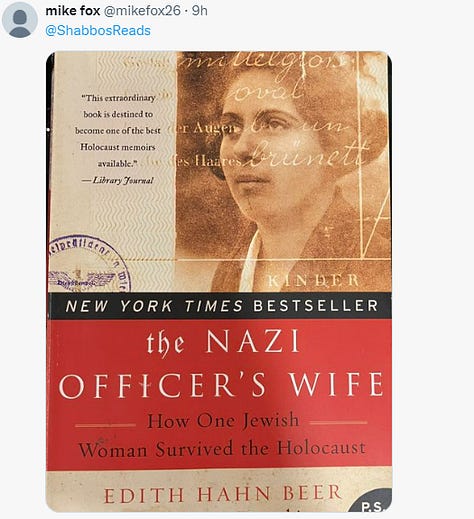




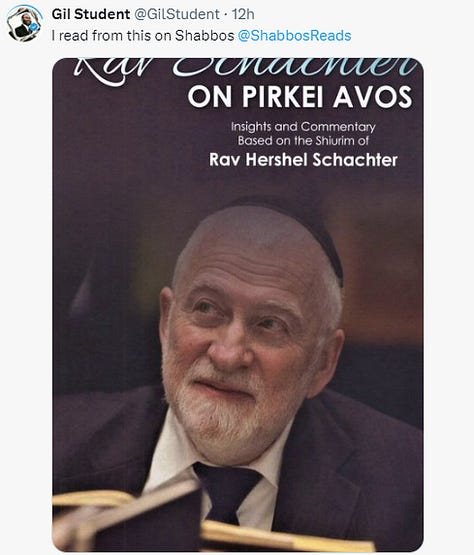
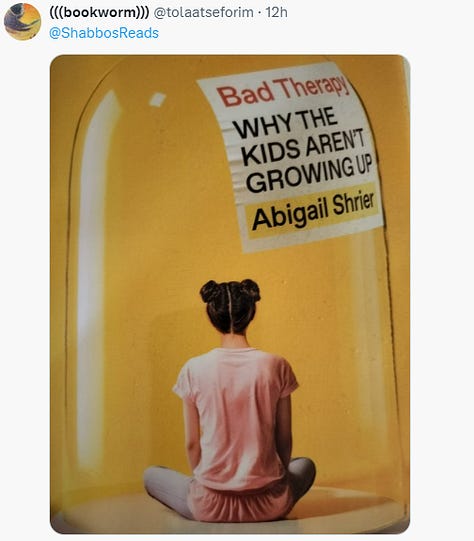







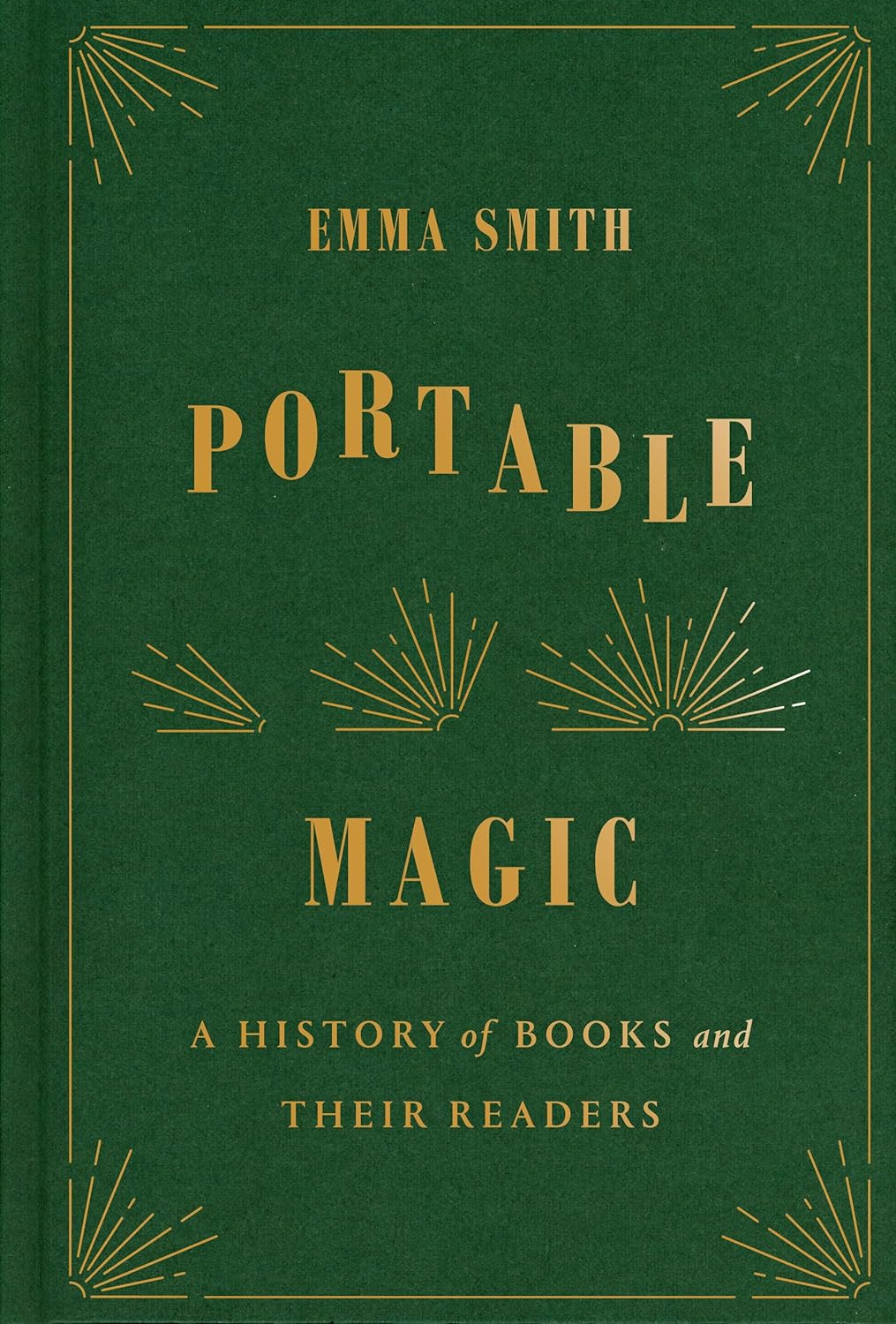
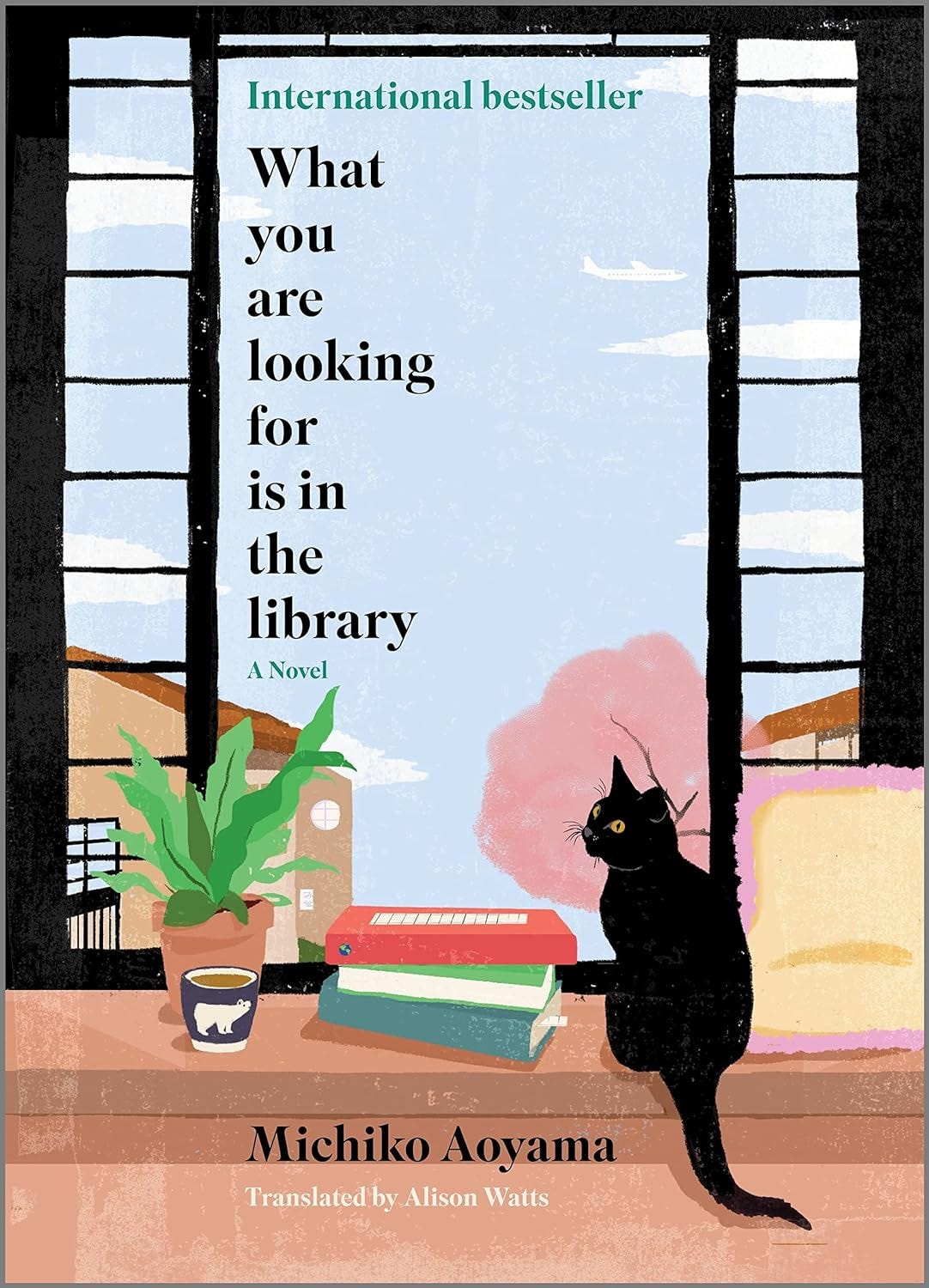
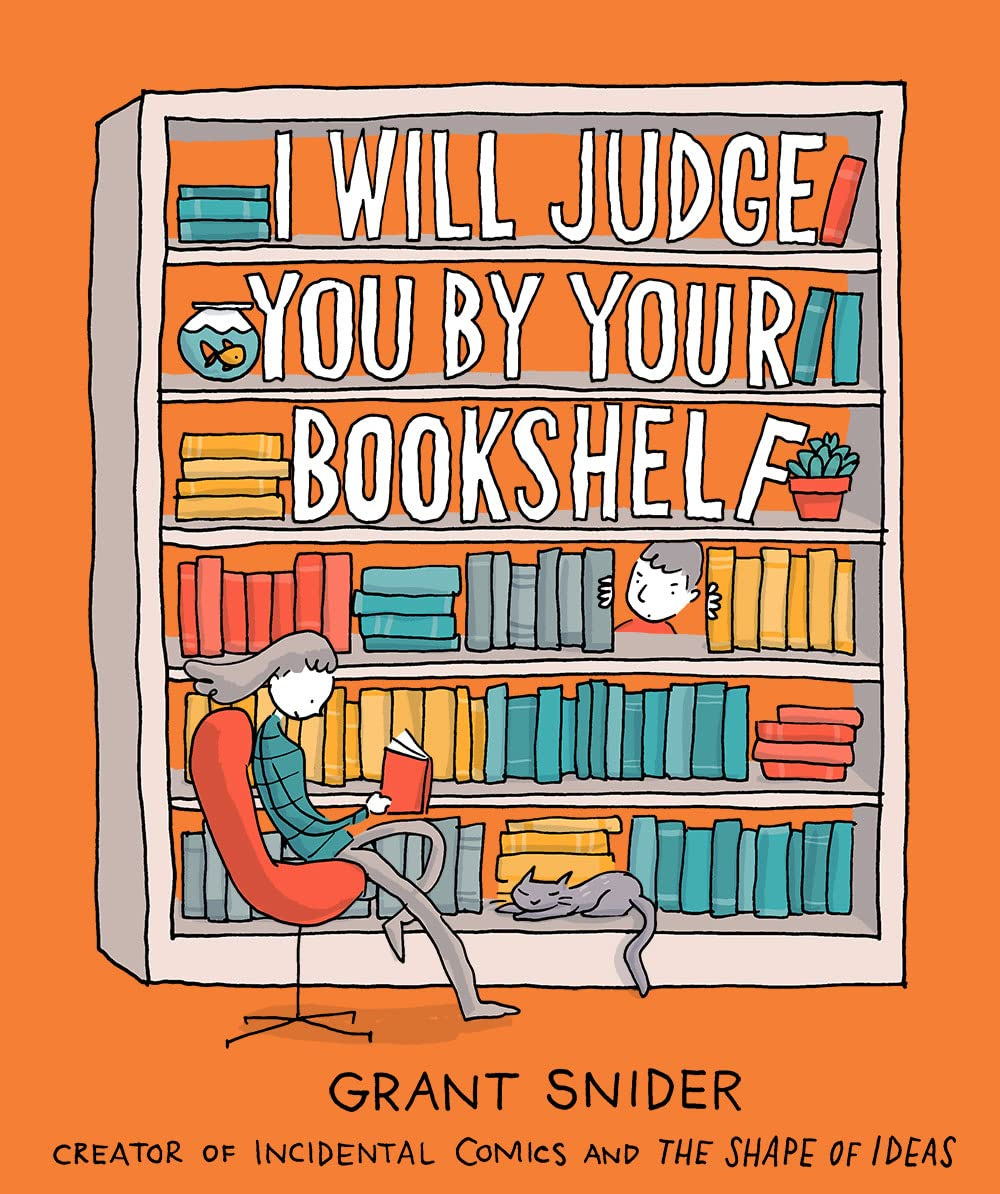



Thank you! Just placed my order.
I Will Judge You by Your Bookshelf — is this a book about me lolol